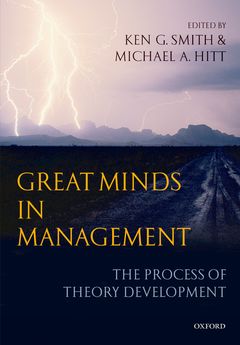In Great Minds In Management Ken G. Smith and Michael A. Hitt have brought together some of the most influential and original thinkers in management. Their contributions to this volume not only outline their landmark contributions to management theory, but also reflect on the process of theory development, presenting their own personal accounts of the gestation of these theories.
The result is not only an ambitious and original panorama of the key ideas in management theory presented by their originators, but also a unique collection of reflections on the process of theory development, an area which to date little has been written about by those who have actually had experience of building theory.
In their concluding chapter, Ken G. Smith and Michael A. Hitt draw together some common themes about the development of management theory over the last half a century, and suggest some of the conclusions to be drawn about how theory comes into being.
Contributors:
Chris Argyris, Albert Bandura, Jay B. Barney, Lee R. Beach, Kim Cameron, Michael R. Darby, Robert Folger, R. Edward Freeman, Michael Frese, J. Richard Hackman, Donald C. Hambrick, Michael A. Hitt, Anne S. Huff, Gary P. Latham, Edwin A. Locke, Henry Mintzberg, Terrence R. Mitchell, Richard T. Mowday, Ikujiro Nonaka, Greg R. Oldham, Jeffrey Pfeffer, Lyman W. Porter, Denise M. Rousseau, W. Richard Scott, Ken G. Smith, Barry M. Staw, Richard M. Steers, Victor H. Vroom, Karl E. Weick, Oliver E. Williamson, Sidney G. Winter, and Lynn Zucker,
Features
- Ambitious and original panorama of management theory
- One-stop resource for all the major management theories by the academics who developed them
- Contributors include the most distinguished and influential thinkers in management
- Each theorist not only describes their theory, but also gives their personal reflections on how it developed
Introduction
1The Process of Developing Mangement Theory
Part I: Individuals and Their Environment
2The Evolution of Social Cognitive Theory
3Image Theory
4The Road to Fairness and Beyond
5Proactive Individualism
6Upper Echelons Theory: Origins, Twists and Turns, and Lessons Learned
7Goal Setting Theory: Theory Building by Induction
8How Job Characteristics Theory Happened
9Do Employee Attitudes Towards Organizations Matter? The Study of Employee Commitment to Organizations
10Developing Psychological Contract Theory
11The Escalation of Commitment: Steps Toward an Organizational Theory
12On the Origins of Expectancy Theory
Part II: Behavior of Organizations
13Double-Loop Learning in Organizations: A Theory of Action Perspective
14Where Does Inequality Come From? The Personal and Intellectual Roots of Resource-Based Theory
15Organizational Effectiveness: Its Demise and Re-Emergence Through Positive Organizational Scholarship
16Managerial and Organizational Cognition: Islands of Coherence
17Develping Theory About the Development of Theory
18Managing Organizational Knowledge: Theoretical and Methodological Foundations
19The Experience of Theorizing: Sensemaking as Topic and Resource
Part III: Environmental Contingencies and Organizations
20The Development of Stakeholder Theory: An Idiosyncratic Approach
21Developing Resouce Dependence Theory: How Theory is Affected by its Environment
22Institutional Theroy: Contributing to a Theoretical Research Program
23Transaction Cost Economics: The Process of Theory Development
24Developing Evolutionary Theory for Economics and Management
25An Evolutionary Approach to Institutions and Social Construction: Process and Structure
Conclusion
26Learning How to Develop Theory from the Masters
Academics, researchers, students, and practitioners with an interest in Management Studies or theoretical development
